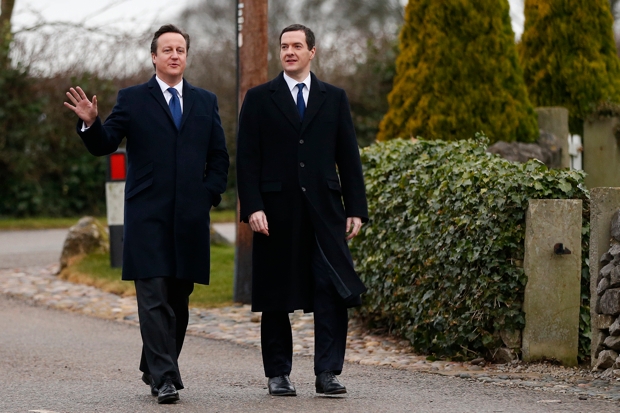If there was any remaining doubt that David Cameron’s resignation honours list was drawn up shamelessly to reward political flunkies it was removed this morning by Desmond Swayne, or Sir Desmond Swayne as we are now supposed to call him following the knighthood bestowed on him in the New Year’s honours. Sir Desmond said:
‘The reason we have a resignation honours list is because over a period of government, particularly difficult government in a coalition, a prime minister has to cajole and get the support of a number people and he builds up a debt of honour.
‘I think that frankly an honours list is a relatively light way of paying it off. I think we get far too excited about these things.’
That is pretty definite, then: Desmond is now Sir Desmond because he is a pathetic ‘yes’ man who has spent the past decade nodding in agreement with his boss. That is the polite way of putting it. Others might say it is an award for having his nose a very long way up David Cameron’s backside. To use Private Eye’s terminology, Sir Desmond has been awarded not so much a KBE as the OBN, the Order of the Brown Nose.
My first reaction is to say that the honours system is beyond saving. If it ever did have any integrity, it has long-since been reduced to barefaced cronyism. The attempt to disguise this by inserting a few lollipop ladies among the flunkies and donors has worn rather thin.
But then Sir Desmond does have a point. Bestowing honours on your cronies is a relatively harmless way of dealing with something which will always be endemic in any political system. In many other countries it would be lucrative government contracts or cash in brown envelopes. Maybe there is an element of that in our political system, too, but if so that is what needs tackling most. By offering an alternative, relatively harmless way of rewarding cronyism, the honours system is reducing the incentive for more serious corruption.
When public money — our money — is wrongfully used for dispensing political favours there is little we can do except complain. When the honours system is used in this way, by contrast, there is something very practical we can do: we can choose not to be impressed. If anyone is introduced to us as ‘Sir’, or we read OBE after their name, we can react by asking them straight: what political favours did you dispense to earn that?
There is one exception to the assertion that political honours are harmless: peerages. It is a disgrace that political cronies are given a legislative function. But then the entire House of Lords is a disgrace. The government lectures the rest of the world on democracy — and then appoints a bunch of the PM’s cronies to review legislation. The House of Lords really does need reform into a fully-elected chamber. As for the rest of the honours system, who much cares?







Comments